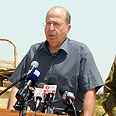
"In light of the changing threats around us, and following abilities developed by the IDF, we reached the conclusion that we must lead a significant reform rather than mortgage our future at the expense of the present."
Related stories:
- IDF cuts bode uncertain future for career soldiers
- Op-ed: The IDF of the next war
- Ya'alon on Syria: We keep to red lines
The plan, which will be brought to the political echelon's approval, includes significant cuts on Air Force squadrons and armored units.
Responding to concerns that the massive cuts may negatively affect the IDF's level of preparedness for a conflict, Ya'alon stressed that "these steps are being taken with responsibility and judgment, and they include an investment in weapons and systems which will help the IDF maintain a dramatic technological gap from the countries and organizations surrounding us.
"We'll continue to invest in accurate armament, intelligence, teleprocessing, active and cyber defense, out of the understanding that the current and future battlefields are completely different from anything we've known in the past."
According to the chief of staff's plan for a reorganization of the IDF, a number of IAF squadrons will be shut down, some immediately and others in the next year and a half. Several armored units and an operational unit in the IAF will also be dismantled. In addition, the number of battleships will be decreased, as well as the number of tanks. The standing army will be reduced by 3,000 to 5,000 troops.
According to Ya'alon, future conflicts will be decided by technological superiority in the air, sea and land, with less heavy equipment and a growing use of sophisticated and unmanned devices.
"We are not becoming dominated by technology, but using it and adjusting it to the new reality in which battles of army against army, like we last saw 40 years ago in the Yom Kippur War, are becoming less and less relevant," he added.
"We'll make certain not to harm our efforts to grow stronger, which will maintain the State of Israel's qualitative advantage. The 2013-2014 budgetary constraints force the IDF to take measures which will affect training and the operational activity of the reserve forces, but without harming our efforts to grow stronger in the long run while taking short-term risks."
The defense minister warned several weeks ago that the army would be forced to "deal with a series of internal challenges, stemming from the economic measures and budget cuts. These constraints are not skipping the IDF and the defense establishment, which is not detached from the economic reality and is willing to carry part of the burden.
"We are dealing with the results of the cuts not without concern. You will feel the consequences in your bones, when you have to increase the number of days of operation activity at the expense of training, in order to meet the budget framework. I promised before, and I promise once again: We will do all it takes and beyond to reduce the damage as much as possible."
- Follow Ynetnews on Facebook and Twitter
- Receive Ynetnews updates
directly to your desktop















